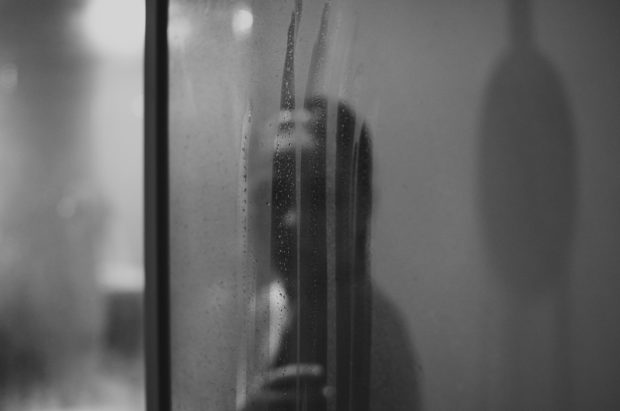You have no items in your cart. Want to get some nice things?
Go shopping
And then the hole blacked out inked in and where there’d been sky there was an eye. I stepped out of the shower’s limp spray toward the door toward the cubicle door toward the hole in the cubicle door toward the nomorehole in the cubicle door and I squinted at the black.
As I squinted at the black the black became a bead and the bead was surrounded by a moat and the moat was of stained ivory and then I knew, knew for certain what I already knew. And in that moment at that instant. At that instant I knew but then it was gone, the black was gone and the bead with its moat was gone and the sky was back again, and light was back again, and the light was streaming through the hole and the hole was in the cubicle door and I was in that cubicle. And to be in a cubicle is to be behind a door and sometimes that door has a hole in. And sometimes a door is not a door at all and sometimes walls aren’t walls either. And my skin was wet and I saw its sheen and I felt its gleam and I saw its nakedness and its nakedness was mine. And the suds clung to my flesh yes they cleaved to my goose-bumped hide and I felt I’d been caught, yes, caught, I’d been enclosed within the black and I’d also been fastened by it, the black had gone through me and the moat had wrapped itself around me and I’d been enfolded and there, wrapped and enfolded in the black was where I had been. And I stared at the sky and the sky was a dot and I thought of the eye and I thought, I cannot come out now, and I thought, how can I come out now, how can I open the door and go through it. And so I hovered and chilled and puckered. For where there is an eye there is a man and where there is a man…
(and I would never thereafter not be not thinking about it)
And nights my mind would sprawl many-limbed like an octopus. It would wave about all roving tentacles and the problem was the overlapping but that wasn’t even the problem because the real problem was the populating. I’d think about all those undulating members replete with their suction cups and those cups perpetually sucking at roundly nothing. Which is to say that my mind was a fist and that inside that fist there was nothing. Which is to say that my mind was gone and that I thereby was gone. Thoughts raced inside me like little rats yes like little rats on little wheels only I was not the rats I was the wheels. Yes I was the wheels which is to say that I was being raced upon and I was oh I was rattling. And oh but the NOISE you see. Which is to say that if the rats stood for goneness then it was by goneness that I was being played and the playing was a din and the din was a rumpus. And it was a rumpus one could drown in. In other words I was how to say the flute not the flautist and oh this blower of breath, this rat, this goneness: it was never not playing me.
And have you ever noticed how full being gone can be.
And by the way I did want to tell you something.
Everything overlapped and inside that, that knot those cliffs that fungus, there was no
breath
And when tonight I see the little nubbin. And when tonight I look up from my book it is the little nubbin that I see. It is the little nubbin which catches my eye and it is the little nubbin which is always there, poking out from the edge of the door like a tongue like a finger and what is it called, what is it really called, technically called, perhaps it is a catch, the catch perhaps, yes, THE CATCH, that sounds about right, it sounds innocuous and practical as the nubbin is, as it ought to be. But still you see the catch does seem like a finger, yes, however I look at it I cannot shake the feeling that it is a little finger curling itself around and into the room. And when I see the little finger tongue nubbin sticking out sticking in I confess I do a little jump –
or rather what happens is that a little jump does me.

About Emilia Ong
Emilia Ong is a writer and journalist living in Margate, UK. A scholarship recipient at the Faber Academy, her current novel-in-progress was shortlisted for the Morley Prize for Writers of Colour in 2021.
- Web |
- More Posts(1)




